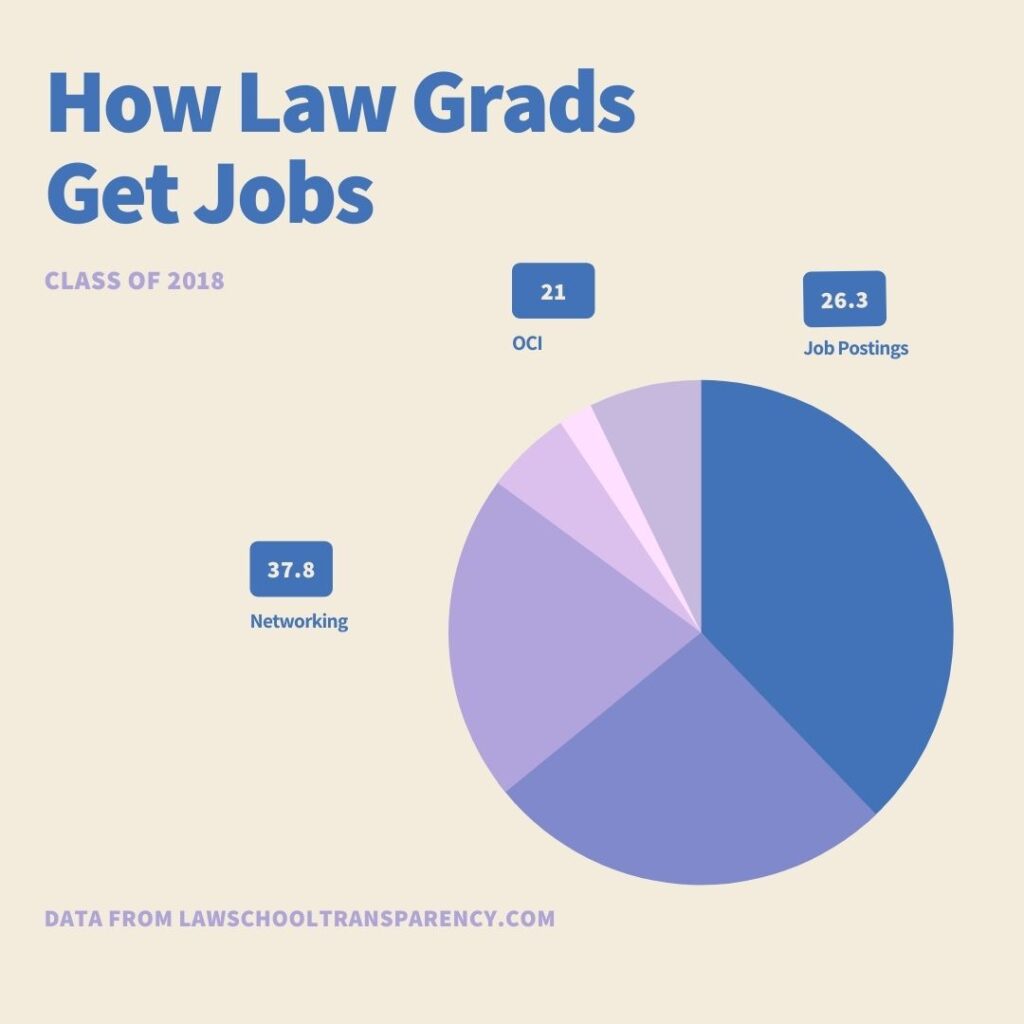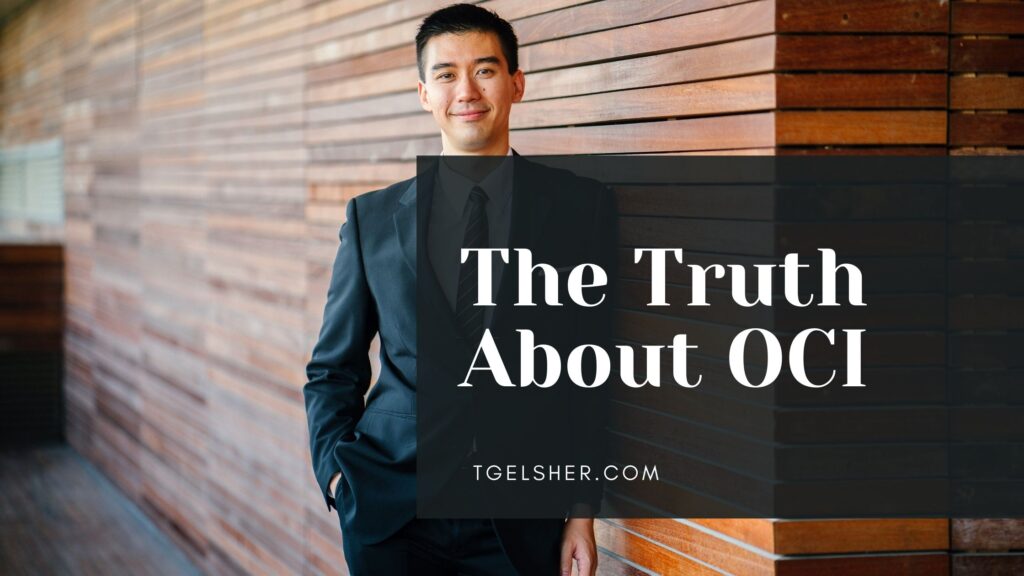OCI or On-Campus Interview is shrouded in mystery, myths, and–sometimes–disinformation. The truth about OCI is that:
- It’s not the only way to get a post-graduate job; in fact, most students don’t get their first job through OCI;
- If you aren’t successful during OCI, you can still get a great job; and
- It’s not your only chance to get into a big law firm.
Read on to learn more. And if you are a pre-law or 1L student, check out this article that answers the question, “What is OCI?”.
The Truth About OCI Number One: Most Students do not get Jobs through OCI
In 2018, only 21% of the graduating class obtained their post-graduate employment through OCI. That’s less than a quarter of the class!
Yet, the myth pervades that OCI is the only way to get a job. But it’s not.
In fact, most graduates obtain their post-grad positions through networking or job postings.

According to Law School Transparency, here is a breakdown of how the class of 2018 obtained their post-graduate positions:
| Networking | 37.8% |
| Job Postings | 26.3% |
| OCI | 21% |
| Prior Job | 5.5% |
| Started Firm | 2.2% |
| Other | 7.2% |
Note also, that this number is high compared to previous years. The table below illustrates the trends.
| 2008 | 25.8% |
| 2009 | 24.7% |
| 2010 | 18.3% |
| 2011 | 13.9% |
| 2012 | 15.1% |
| 2013 | 15.9% |
| 2014 | 16% |
| 2015 | 16.4% |
| 2016 | 20.1% |
| 2017 | 21.5% |
| 2018 | 21% |
As you can see, in some years the number has been as low as 13.9%, but it was never higher than 25.8% in the years surveyed.
It is also important to note that OCI does not necessarily mean Big Law either. These numbers were gathered from the National Association of Law Placement, which asks schools to report where their graduates obtained their position. If a law school hosts a non-Big Law employer during On-Campus Interview, this could be reported as an OCI job.
For the truth about when law graduates actually obtain their post-grad positions, check out this post.
The Truth About OCI Number Two: OCI Isn’t your Only Chance to Obtain a Big Law job
So this one is a bit of a partial truth because, in most cases, OCI is your only chance to obtain a Big Law job during law school.
However, many recent law grads lateral into Big Law jobs as soon as a year after graduating law school.
There are a couple of reasons for this. Among other things, summer associate hiring is not an exact science.
Consider this: summer associate hiring requires law firms to forecast their hiring needs two years in advance! Businesses don’t operate like this under normal circumstances. But because these firms are competing for graduates at the top of the class, they are willing to take the risk.
That said, it is better to underestimate than to overestimate, so fiscally responsible law firms will be somewhat conservative in their forecasts and hire later if need be.
On top of this, not every summer associate sticks around. After a few short years, many of them lateral to other firms or out of Big Law completely. So no matter how committed a firm is to hiring through OCI, they can never make perfect predictions. And they will often need more talent.
Related: The Most Common On-Campus Interview Questions
The Truth About OCI Number Three: OCI Isn’t the Only Way to Land a Legal Job
If OCI wasn’t for you, for whatever reason, do not despair. Again, most graduates don’t get their post-grad positions through OCI.
Instead, most graduates obtain their first job out of law school through networking or job postings.
The job posting board at most law schools is a seriously underutilized tool. My guess is this is because students don’t realize how valuable it is.
Most students assume that OCI is the only way to get a job because of the visibility that the program gets from law students, administration, and the faculty. If OCI doesn’t work out for them, students then feel burnt out, overwhelmed, or demoralized. The last thing they want to do is turn to the job board or start networking.
But both of these have historically proven to be far more effective than On-Campus Interview.
So when you are ready to get back in the saddle, consider using your school’s job board and beginning to network with attorneys and … fellow law students. Remember, peers often refer others to opportunities or positions.
Keep in mind, however, that it is uncommon for legal employers–or any business for that matter–to forecast their hiring needs as far in advance as OCI might have you believe is normal. Most legal employers do not hire until 3L year or later. And some do not hire until after bar results have been released.
So keep looking, but also keep in mind that you don’t have to adhere to an arbitrary timeline. And if you haven’t obtained a job before you graduate, congrats. You are normal, and you’ve done nothing wrong.
The Truth About OCI Number Four: Interviewers Make Serious Mistakes
Have you ever heard horror stories about the terribly inappropriate summer associate (I’ve heard some doozies), or wondered how the biggest jerk in your class got a job at such a great firm?
The truth is law firms make mistakes and sometimes big ones. Sometimes they misjudge an applicant and make a bad hire. Other times they pass over a really great candidate.
The upshot of this is that if you were not selected for a position with an OCI firm, you shouldn’t feel embarrassed or like you’ve done something wrong. (I know that is easier said than done.)
I’ve spoken with countless employers and interviewers who realize the flaws in the On-Campus Interview system. These interviewers may meet more than 15 students during a single interview day during short, twenty-minute sessions.
It is an unfair, highly imperfect system.
So if OCI didn’t work out for you, please don’t feel that your law school career is ruined or that you’ll never work in Big Law.
If you liked The Truth About OCI . . .
Check out the related posts for what to read next, and please hit the heart button below!







Thank you. This is good to hear.
You’re welcome! Let me know if you have any questions!